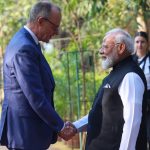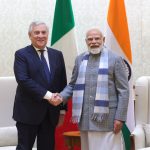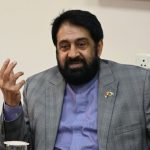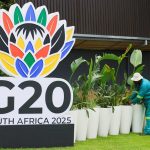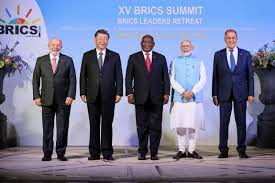
JOHANNESBURG: A new expanded BRICS was born on a crisp wintry morning in Johannesburg as the leaders of BRICS nations unveiled their collective decision to enlarge the grouping by adding six new countries from the Global South.
Six new countries, which have been added to BRICS include Argentina, Egypt, Iran, Ethiopia, Saudi Arabia, and the United Arab Emirates. The selection of new members came after intense negotiations and burning much midnight oil which saw the leaders and sherpas of Permanent 5 countries of BRICS debating the future of this grouping of emerging powers.
The expanded BRICS grouping, which will come into being after the formal induction of new members on January 1, 2024, can potentially emerge as a challenger to G7 and a champion of the Global South. The new 2.0 BRICS reflects regional balance as the new countries represent different regions of the world.
Fully backing the expansion of the grouping, Prime Minister Narendra Modi underlined that the addition of new members will further add dynamism the grouping. “We have taken important decision to expand BRICS. This will further strengthen the beliefs of many countries in this multipolar world. I am happy that our teams have agreed on the guiding principles, standards, criteria, and procedures for the expansion of BRICS,” PM Modi said at a joint press conference by the leaders of BRICS countries at the conclusion of the 15th BRICS summit on August 24. He added: “I am confident that we would be able to give new dynamism to BRICS by working with the new member countries of the grouping. India has had very deep and historic relations with all these countries.”
Indonesia was a surprise omission, as it was a top contender to join BRICS. Indonesia was not excluded as it met all criteria, but Jakarta conveyed that it is not ready to join BRICS yet as it has to take approval of ASEAN, said well-placed sources.
The expansion of the grouping is marked by the strategic intention to provide greater prominence to the Global South in the BRICS agenda. “We appreciate the considerable interest shown by countries of the global South in membership of BRICS,” said the Johannesburg Declaration.
The Johannesburg Declaration also underlined that “true to the BRICS Spirit and commitment to inclusive multilateralism, BRICS countries reached consensus on the guiding principles, standards, criteria and procedures of the BRICS expansion process.”
The criteria were not unveiled, but official sources disclosed that
Official sources told this writer that it is not the end of the expansion of BRICS, but the next phase of expansion will see the induction of partner countries. “We have also tasked our Foreign Ministers to further develop the BRICS partner country model and a list of prospective partner countries and report by the next Summit,” said the Johannesburg Declaration
While the inclusion of new members have enhanced global stature of the BRICS, the inclusion of Iran, the target of Western actions, may push BRICS in the direction of anti-West posturing which is being choreographed by the China and Russia.
“This membership expansion is historic,” China’s top leader, Xi Jinping, said. “It shows the determination of BRICS countries for unity and cooperation for the broader developing world.”
While Xi has a lot to rejoice in the expansion of BRICS, India, too, has a lot to be pleased about as all new members have also robust relations with New Delhi.
Another important takeaway of the BRICS summit was a collective decision to encourage trade in national currency of BRICS countries that will encourage the trend towards de-dollarisation.
On the issue of the UNSC reforms, the Johannesburg Declaration saw a movement forward as the BRICS joint statement for the first time spoke about the UNSC expansion and democratisation of UNSC.
BRICS leaders also responded positively to suggestions made by Prime Minister Modi for strengthening the grouping.
These included creating a BRICS Space Exploration Consortium, cooperation in education, skill development and technology, skills mapping together to identify each other’s strengths, creating the International Big Cat Alliance, and creating a repository of traditional medicine.
“To make BRICS a future ready organization, we have to make our societies future ready. Technology will play an important role in this,” said Modi.
The new BRICS 2.0, in the words of PM Modi will be “Breaking barriers, revitalizing economies, Inspiring Innovation, creating opportunities, and Shaping the future.”
(Manish Chand is CEO, Centre for Global Insights India, a think tank focused on global affairs and India Writes Network. He is Editor-in-Chief, India and the World, a journal on international affairs)
Author Profile

- Manish Chand is Founder and Editor-in-Chief of India Writes Network (www.indiawrites.org) and India and World, a pioneering magazine focused on international affairs. He is CEO, Centre for Global India Insights, an India-based think tank focused on global affairs.
Latest entries
 India and the WorldJanuary 13, 2026India, Germany raise the bar for defence, economic ties
India and the WorldJanuary 13, 2026India, Germany raise the bar for defence, economic ties India and the WorldDecember 12, 2025India-Italy bonding: Tajani’s visit raises the bar for business, maritime ties
India and the WorldDecember 12, 2025India-Italy bonding: Tajani’s visit raises the bar for business, maritime ties In ConversationNovember 26, 2025G20 is a Force for global Good
In ConversationNovember 26, 2025G20 is a Force for global Good articlesNovember 26, 2025Rescuing G20 from North-South divide: Ubuntu Moment
articlesNovember 26, 2025Rescuing G20 from North-South divide: Ubuntu Moment

